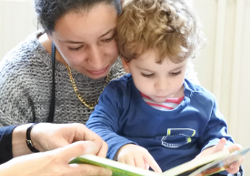October 2020
Authors: Clément de Chaisemartin, Charlotte Combier, Quentin Daviot, Marc Gurgand, Sophie Kern
Contact: marc.gurgand@psemail.eu
…………………………
 Unequal from birth: Can text messages improve language interactions between parents and children in disadvantaged families?
Unequal from birth: Can text messages improve language interactions between parents and children in disadvantaged families?
Summary
Children from a disadvantaged background begin school with, on average, a more limited command of language than children from an affluent background. This handicaps their learning during school, increases their risk of dropping out and impacts their future living conditions. However, numerous studies have shown that this situation can be corrected from early childhood, in particular by giving more tools to vulnerable families to help their very young children.
This study uses a randomized controlled trial to evaluate Project SMS, conducted by the 1001mots association. The project aims to raise awareness among parents from modest backgrounds about their child’s development issues and to suggest ideas for educational activities and games by sending three SMS messages per week for seven months, supplemented by calls and book deliveries. Our study shows that Project SMS has a positive impact on the reading practices of the most disadvantaged parents and those with the youngest children.
However, this effect is small and does not extend to the other parenting practices measured. This result could be explained by the fact that parents report that they are already familiar with most of the recommended practices, leaving little room for the scheme to encourage their adoption. These limited impacts on parents explain why we do not find significant effects on our measures of child development.
Key points
- In France, nearly 500,000 children between 0 and 3 years old grow up in a poor family, which represents 22.7% of French children between 0 and 3 years old.
- When they begin pre-school, these children have a poorer language pro ciency, on average, than children who grew up in an affluent family.
- We use a randomized controlled trial to evaluate the effect of a program that provides SMS support to low-income parents with a place in a childcare centre.
- Project SMS has a small positive impact on parents’ reading practices, mainly among the most disadvantaged parents and those with the youngest children.
- However, we do not observe any effect of the intervention on our measures of child development. These small effects may be due to the fact that most parents report that they are already following recommended practices.
Les auteurs remercient pour leur soutien l’ANR, l’ARS Auvergne-Rhône-Alpes, la France s’engage, la Fondation Bellon, la Cnaf, et l’Université de Californie Santa Barbara.
Ce message est également disponible en :  French
French



